 Tìm kiếm
Tìm kiếm
Chương IV Nghị định 23/2015/NĐ-CP: Quản lý nhà nước về chứng thực
| Số hiệu: | 23/2015/NĐ-CP | Loại văn bản: | Nghị định |
| Nơi ban hành: | Chính phủ | Người ký: | Nguyễn Tấn Dũng |
| Ngày ban hành: | 16/02/2015 | Ngày hiệu lực: | 10/04/2015 |
| Ngày công báo: | 16/03/2015 | Số công báo: | Từ số 357 đến số 358 |
| Lĩnh vực: | Dịch vụ pháp lý | Tình trạng: | Còn hiệu lực |
TÓM TẮT VĂN BẢN
Chính phủ vừa ban hành Nghị định 23/2015/NĐ-CP quy định về cấp bản sao từ sổ gốc, chứng thực bản sao từ bản chính, chứng thực chữ ký và chứng thực hợp đồng, giao dịch.
Theo đó, Quy định cụ thể về thẩm quyền và trách nhiệm chứng thực của Ủy ban nhân dân cấp xã, đơn cử như:
- Thẩm quyền chứng thực hợp đồng, giao dịch liên quan đến tài sản là động sản.
- Thẩm quyền chứng thực hợp đồng, giao dịch liên quan đến thực hiện các quyền của người sử dụng đất theo quy định của Luật đất đai.
- Thẩm quyền chứng thực hợp đồng, giao dịch về nhà ở theo quy định của Luật Nhà ở.
Nghị định này có hiệu lực từ ngày 10/4/2015 và thay thế Nghị định 79/2007/NĐ-CP , 04/2012/NĐ-CP .
Văn bản tiếng việt
Văn bản tiếng anh
Bộ Tư pháp giúp Chính phủ thống nhất quản lý nhà nước về chứng thực trong phạm vi cả nước, có nhiệm vụ, quyền hạn sau đây:
1. Soạn thảo, trình cơ quan nhà nước có thẩm quyền ban hành hoặc ban hành theo thẩm quyền văn bản quy phạm pháp luật về chứng thực;
2. Hướng dẫn, chỉ đạo chung việc thực hiện văn bản quy phạm pháp luật về chứng thực;
3. Kiểm tra, thanh tra hoạt động chứng thực; giải quyết khiếu nại, tố cáo và xử lý các vi phạm hành chính liên quan đến chứng thực theo thẩm quyền;
4. Ứng dụng công nghệ thông tin trong thực hiện chứng thực và quản lý nhà nước về chứng thực;
5. Hợp tác quốc tế về chứng thực;
6. Hằng năm, tổng hợp tình hình và thống kê số liệu các việc về chứng thực báo cáo Chính phủ.
1. Bộ Ngoại giao phối hợp với Bộ Tư pháp thực hiện quản lý nhà nước về chứng thực đối với các Cơ quan đại diện, có nhiệm vụ, quyền hạn sau đây:
a) Hướng dẫn, chỉ đạo, kiểm tra, thanh tra về công tác chứng thực tại các Cơ quan đại diện;
b) Tổ chức bồi dưỡng nghiệp vụ chứng thực cho viên chức ngoại giao, viên chức lãnh sự làm công tác chứng thực tại các Cơ quan đại diện;
c) Hằng năm, tổng hợp tình hình và thống kê số liệu về chứng thực của các Cơ quan đại diện gửi Bộ Tư pháp để tổng hợp;
d) Giải quyết khiếu nại, tố cáo và xử lý các vi phạm hành chính liên quan đến chứng thực theo thẩm quyền.
2. Cơ quan đại diện thực hiện quản lý nhà nước về chứng thực trong phạm vi địa bàn, có nhiệm vụ, quyền hạn sau đây:
a) Thực hiện các việc chứng thực thuộc thẩm quyền của Cơ quan đại diện theo quy định tại Nghị định này;
b) Lưu trữ sổ chứng thực, Văn bản chứng thực;
c) Giải quyết khiếu nại, tố cáo và xử lý các vi phạm hành chính liên quan đến chứng thực theo thẩm quyền;
d) Hằng năm, tổng hợp tình hình và thống kê số liệu về chứng thực báo cáo Bộ Ngoại giao theo quy định.
Viên chức lãnh sự, viên chức ngoại giao làm công tác chứng thực có trách nhiệm giúp Cơ quan đại diện thực hiện các nhiệm vụ quy định tại các Điểm a, b và d Khoản 2 Điều này.
1. Ủy ban nhân dân cấp tỉnh thực hiện quản lý nhà nước về chứng thực trong địa phương, có nhiệm vụ, quyền hạn sau đây:
a) Tổ chức triển khai thực hiện văn bản quy phạm pháp luật về chứng thực tại địa phương;
b) Hướng dẫn, bồi dưỡng nghiệp vụ chứng thực cho cán bộ, công chức làm công tác chứng thực tại Phòng Tư pháp, Ủy ban nhân dân cấp xã và công chứng viên của các tổ chức hành nghề công chứng;
c) Tổ chức tuyên truyền, phổ biến các quy định pháp luật về chứng thực;
d) Ứng dụng công nghệ thông tin trong thực hiện chứng thực và quản lý nhà nước về chứng thực trong phạm vi địa phương, đáp ứng yêu cầu cung cấp và trao đổi thông tin;
đ) Kiểm tra, thanh tra hoạt động chứng thực của Phòng Tư pháp, Ủy ban nhân dân cấp xã, các tổ chức hành nghề công chứng; có biện pháp chấn chỉnh tình hình lạm dụng yêu cầu bản sao có chứng thực đối với giấy tờ, văn bản khi thực hiện thủ tục hành chính trên địa bàn;
e) Giải quyết khiếu nại, tố cáo và xử lý các vi phạm hành chính liên quan đến chứng thực theo thẩm quyền;
g) Định kỳ 6 tháng và hằng năm, tổng hợp tình hình và thống kê số liệu về chứng thực trong địa phương, báo cáo Bộ Tư pháp theo quy định.
Sở Tư pháp giúp Ủy ban nhân dân cấp tỉnh thực hiện các nhiệm vụ quy định tại các Điểm a, b, c, d, đ và g của Khoản này.
2. Ủy ban nhân dân huyện, quận, thị xã, thành phố thuộc tỉnh (sau đây gọi chung là Ủy ban nhân dân cấp huyện) thực hiện quản lý nhà nước về chứng thực trong địa phương, có nhiệm vụ, quyền hạn sau đây:
a) Hướng dẫn, bồi dưỡng nghiệp vụ chứng thực cho cán bộ, công chức làm công tác chứng thực tại Ủy ban nhân dân cấp xã trên địa bàn;
b) Tổ chức tuyên truyền, phổ biến các quy định của pháp luật về chứng thực;
c) Cấp bản sao có chứng thực từ bản chính hợp đồng, giao dịch đã được chứng thực;
d) Lưu trữ sổ chứng thực, Văn bản chứng thực;
đ) Kiểm tra, thanh tra hoạt động chứng thực của Ủy ban nhân dân cấp xã; có biện pháp chấn chỉnh tình hình lạm dụng yêu cầu bản sao có chứng thực đối với giấy tờ, văn bản khi thực hiện thủ tục hành chính trên địa bàn;
e) Giải quyết khiếu nại, tố cáo và xử lý các vi phạm hành chính liên quan đến chứng thực theo thẩm quyền;
g) Định kỳ 6 tháng và hằng năm, tổng hợp tình hình và thống kê số liệu về chứng thực, báo cáo Ủy ban nhân dân cấp tỉnh theo quy định.
Phòng Tư pháp giúp Ủy ban nhân dân cấp huyện thực hiện các nhiệm vụ quy định tại các Điểm a, b, c, d, đ và g Khoản này và thực hiện các việc chứng thực thuộc thẩm quyền của Phòng Tư pháp theo quy định của Nghị định này. Trưởng Phòng Tư pháp, Phó Trưởng Phòng Tư pháp phải thông báo mẫu chữ ký khi ký chứng thực cho Sở Tư pháp.
3. Ủy ban nhân dân cấp xã thực hiện quản lý nhà nước về chứng thực trong địa phương, có nhiệm vụ, quyền hạn sau đây:
a) Thực hiện các việc chứng thực thuộc thẩm quyền của Ủy ban nhân dân cấp xã theo quy định tại Nghị định này;
b) Tuyên truyền, phổ biến, vận động nhân dân chấp hành các quy định của pháp luật về chứng thực;
c) Cấp bản sao có chứng thực từ bản chính hợp đồng, giao dịch đã được chứng thực;
d) Lưu trữ sổ chứng thực, Văn bản chứng thực;
đ) Giải quyết khiếu nại, tố cáo và xử lý các vi phạm hành chính liên quan đến chứng thực theo thẩm quyền;
e) Định kỳ 6 tháng và hằng năm, tổng hợp tình hình và thống kê số liệu về chứng thực báo cáo Ủy ban nhân dân cấp huyện theo quy định.
Công chức Tư pháp - Hộ tịch giúp Ủy ban nhân dân cấp xã thực hiện các nhiệm vụ quy định tại các Điểm a, b, c, d và e Khoản này. Chủ tịch Ủy ban nhân dân cấp xã, Phó Chủ tịch Ủy ban nhân dân cấp xã phải thông báo mẫu chữ ký khi ký chứng thực cho Sở Tư pháp.
1. Việc xử phạt vi phạm hành chính đối với người thực hiện chứng thực, người yêu cầu chứng thực, người dịch được thực hiện theo quy định của pháp luật về xử lý vi phạm hành chính.
2. Trong trường hợp người thực hiện chứng thực gây thiệt hại cho cá nhân, tổ chức do lỗi của mình thì sẽ bị xử lý kỷ luật, bồi thường theo quy định của pháp luật.
3. Trong trường hợp người dịch gây thiệt hại cho người yêu cầu dịch do lỗi của mình thì phải bồi thường theo quy định của pháp luật.
Việc khiếu nại, giải quyết khiếu nại, việc tố cáo, giải quyết tố cáo đối với các hành vi vi phạm pháp luật trong hoạt động chứng thực được thực hiện theo quy định của pháp luật về khiếu nại, tố cáo.
STATE MANAGEMENT IN AUTHENTICATION
Article 41. Responsibilities of the Ministry of Justice for state management in authentication
The Ministry of Justice that help the Government unify state management across the country shall carry out the following duties and authorities:
1. Produce a draft of legal documents in authentication and promulgate it within its competence, or make the submission to competent state agencies for promulgation
2. Provide guidance on the implementation of legal documents in authentication
3. Carry out inspection and investigation into authentication activities; settle complaints, denunciation and handle administrative authentication-related violations within competence;
4. Apply information technology in authentication and state management in authentication;
5. International cooperation in authentication;
6. Annually, report the implementation of authentication in general and statistical data about authentication to the Government.
Article 42. Responsibilities of the Ministry of Foreign Affairs for state management in authentication
1. The Ministry of Foreign Affairs in cooperation with the Ministry of Justice in the implementation of state management in authentication with respect to the representative agencies shall carry out the following duties and authorities:
a) Instruct, inspect and investigate authentication activities performed at the representative agencies;
b) Organize training in professional competence in authentication to diplomats, consuls who perform authentication at the representative agencies;
c) Annually, report to the Ministry of Justice the implementation of authentication and statistical data about authentication at the representative agencies;
d) Settle complaints, denunciation and handle authentication-related violations within competence;
2. The representative agency that exercises state management within the administrative division shall carry out the following duties and authorities:
a) Carry out authentication within authority of the representative agency as stipulated hereof;
b) Store authentication books and authenticated documents;
d) Settle complaints, denunciation and handle authentication-related violations within competence;
d) Annually, report the implementation of authentication in general and statistical data about authentication to the Ministry of Foreign Affairs.
Diplomats, consuls who perform authentication shall be responsible for helping the representative agency carry out the duties as defined in Points a, b and d, Clause 2 of this Article.
Article 43. Responsibilities of the People’s Committees at all levels for state management in authentication
1. The People’s Committees of provincial level that exercise state management in authentication within the administrative division shall carry out the following duties and authorities:
a) Organize the implementation of legal documents in authentication in the locality;
b) Instruct and provide training in professional competence in authentication to officials and public servants who perform authentication at the Justice Office, the People’s Committees of communes and all notaries from notary organizations;
c) Organize propaganda about regulations of the law on authentication;
d) Apply information technology in authentication and state management in authentication within the administrative division, satisfy requirements for supply and exchange of information;
dd) Carry out inspection and investigation into authentication activities performed in the Justice Office, the People’s Committees of communes, notary organizations; take measures to cope with abuses of certification of true copies in the implementation of administrative procedures in the administrative division;
e) Settle complaints, denunciation and handle authentication-related violations within competence;
g) On the six-month or annual basis, report to the Ministry of Justice the implementation of authentication in general and statistical data about authentication in the locality;
The Services of Justice shall help the People’s Committees of provincial level implement the duties as prescribed in Points a, b, c, d, dd and g of this Clause;
2. The People’s Committees of provincial-affiliated districts, communes and cities (hereinafter referred to as the People’s Committees of communes) that exercise state management in authentication in the locality shall carry out the following duties and authorities:
a) Instruct and provide training in professional competence in authentication to officials and public servants who perform authentication at the People’s Committees of communes in the administrative division;
c) Organize propaganda about regulations of the law on authentication;
c) Issue certified true copies from originals of authenticated contracts;
d) Store authentication books and authenticated documents;
dd) Carry out inspection and investigation into authentication activities performed at the People’s Committees of communes; take measures to cope with abuses of certification of true copies in the implementation of administrative procedures in the administrative division;
e) Settle complaints, denunciation and handle authentication-related violations within competence;
g) On the six-month or annual basis, report to the People’s Committees of provincial level the implementation of authentication in general and statistical data about authentication;
The Justice Office shall help the People’s Committees of district level implement the duties as prescribed in Points a, b, c, d, dd and g of this Clause and perform authentication activities within authority of the Justice Office as stipulated hereof. Heads, deputy heads of the Justice Office must announce specimen signatures upon signing authentication for the Services of Justice.
3. The People’s Committees of communes that exercise state management in authentication in the locality shall carry out the following duties and authorities:
a) Perform authentication within authority of the People’s Committees of communes as stipulated hereof;
b) Organize propaganda about regulations of the law on authentication;
c) Issue certified true copies from originals of authenticated contracts;
d) Store authentication books and authenticated documents;
dd) Settle complaints, denunciation and handle authentication-related violations within competence;
g) On the six-month or annual basis, report to the People’s Committees of communes the implementation of authentication in general and statistical data about authentication;
Civil judicial officials shall help the People’s Committees of communes implement the duties as prescribed in Points a, b, c and e of this Clause. Presidents of People’s Committees of communes, deputy presidents of the People’s Committees of communes must announce specimen signatures upon performing authentication for the Services of Justice.
Article 44. Handling of violations
1. Handling of violations with respect to authenticating persons, requesters for authentication and translators shall be carried out under the law on handling of administrative violations.
2. Any authenticating person that causes damage to organizations, individuals shall be disciplined and make compensation according to the law.
3. Any translator that causes damage to requesters (by the translator’s fault) shall make compensation according to the law.
Article 45. Handling of complaints, denunciation
Lodging and handling of complaints and denunciation against violations of the law on authentication shall be carried out under the law on complaints, denunciation.
Văn bản liên quan
Cập nhật
Bài viết liên quan
Xác nhận sơ yếu lý lịch có mất phí không? Mức phí xác nhận sơ yếu lý lịch mới nhất 2025
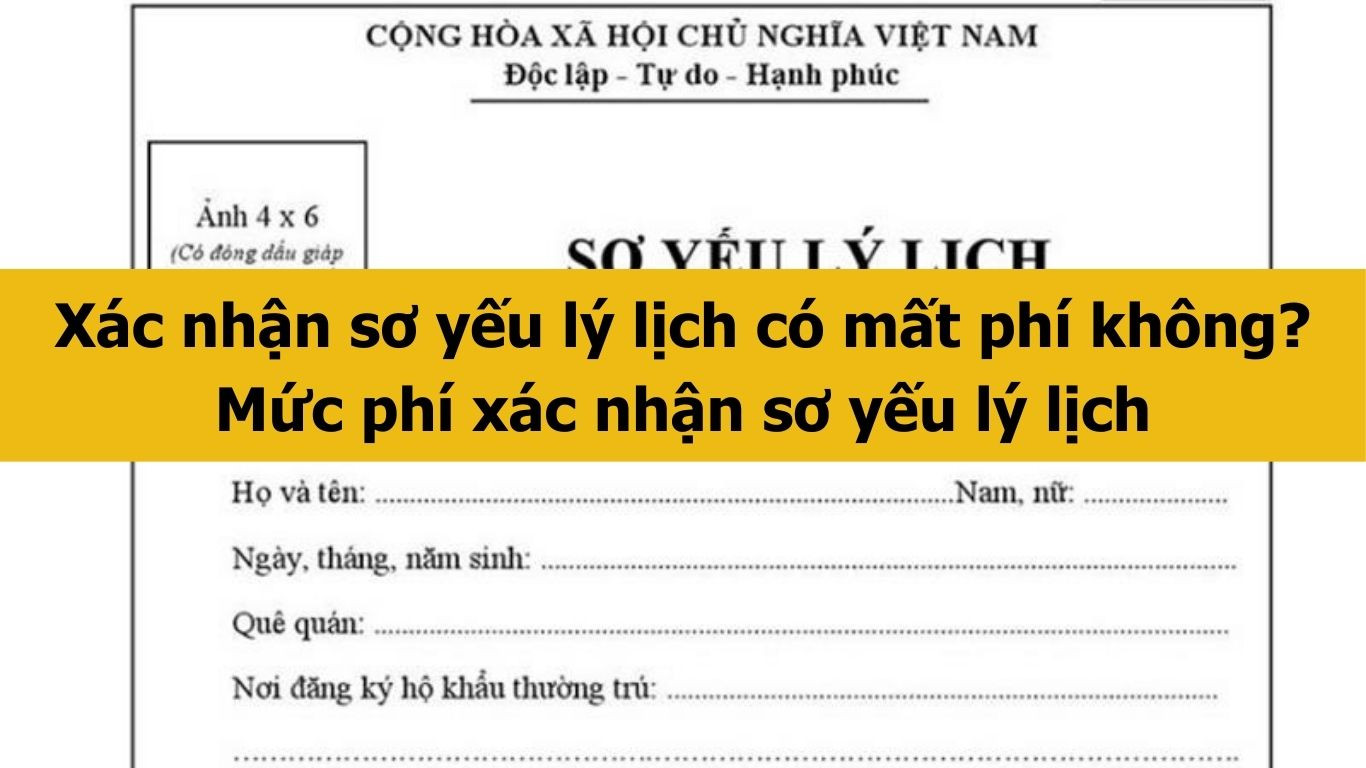
Xác nhận sơ yếu lý lịch có mất phí không? Mức phí xác nhận sơ yếu lý lịch mới nhất 2025
Sơ yếu lý lịch là loại giấy tờ quan trọng trong rất nhiều hoạt động như xin việc làm, nhập học…Nhiều người vẫn còn thắc mắc xác nhận sơ yếu lý lịch có mất phí không? Mức phí xác nhận sơ yếu lý lịch mới nhất năm 2025 là bao nhiêu? Bài viết này chúng tôi sẽ trả lời cho các câu hỏi đó. 07/01/2025Xác nhận sơ yếu lý lịch ở nơi tạm trú có được không?
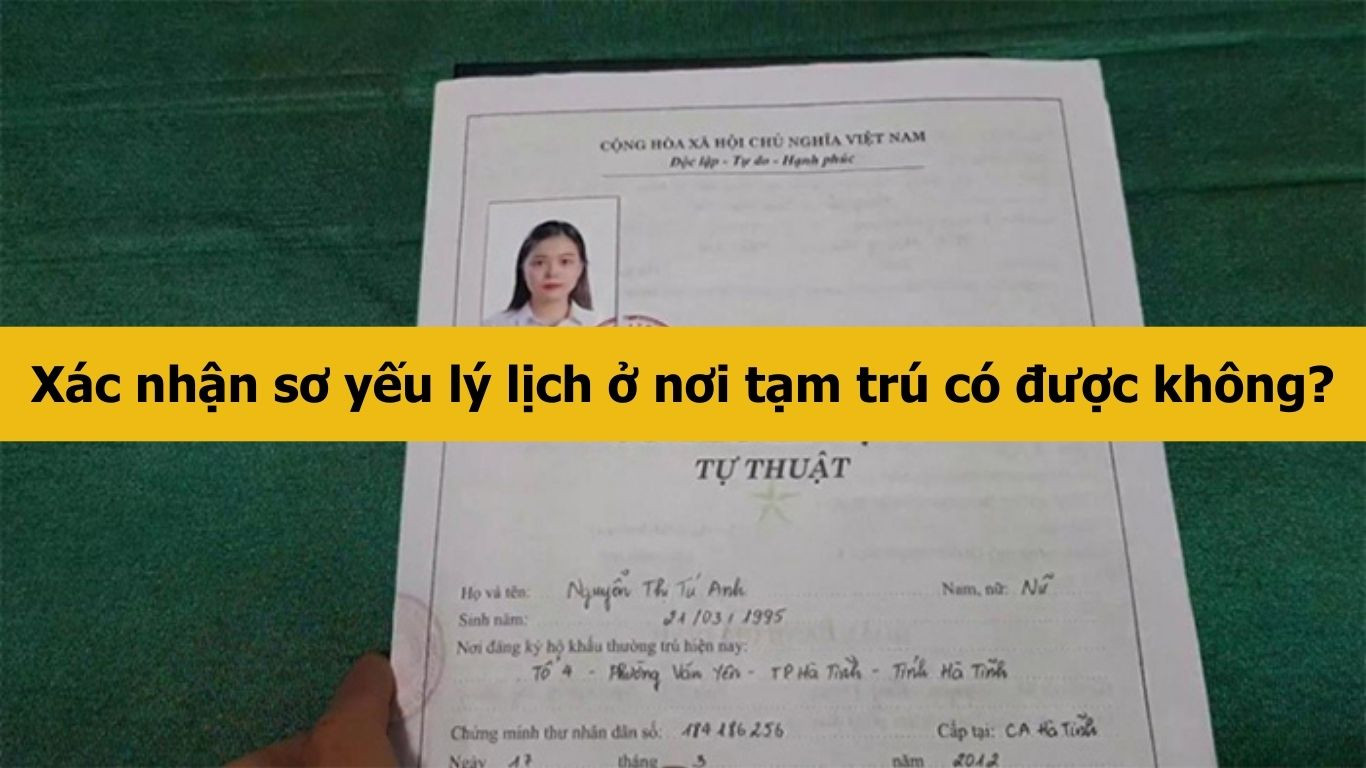
Xác nhận sơ yếu lý lịch ở nơi tạm trú có được không?
Sơ yếu lý lịch là loại giấy tờ quan trọng trong rất nhiều hoạt động như xin việc làm, nhập học…Nhiều người vẫn còn thắc mắc xác nhận sơ yếu lý lịch ở nơi tạm trú có được không? Bài viết này chúng tôi sẽ trả lời cho câu hỏi đó. 07/01/202503 mẫu sơ yếu lý lịch tự thuật mới nhất 2025 và cách ghi chi tiết

03 mẫu sơ yếu lý lịch tự thuật mới nhất 2025 và cách ghi chi tiết
Sơ yếu lý lịch tự thuật là một tài liệu quan trọng trong nhiều thủ tục hành chính, từ xin việc làm, nhập học đến các quy trình tuyển dụng trong cơ quan nhà nước. Để hỗ trợ bạn đọc dễ dàng lựa chọn và điền đúng thông tin, bài viết này sẽ giới thiệu 03 mẫu sơ yếu lý lịch tự thuật mới nhất năm 2025 kèm theo hướng dẫn chi tiết cách ghi. Những mẫu này được thiết kế đáp ứng các tiêu chuẩn mới, phù hợp với yêu cầu hiện hành và giúp bạn hoàn thiện hồ sơ nhanh chóng, chính xác. 06/01/2025Xác nhận sơ yếu lý lịch khác tỉnh được không?
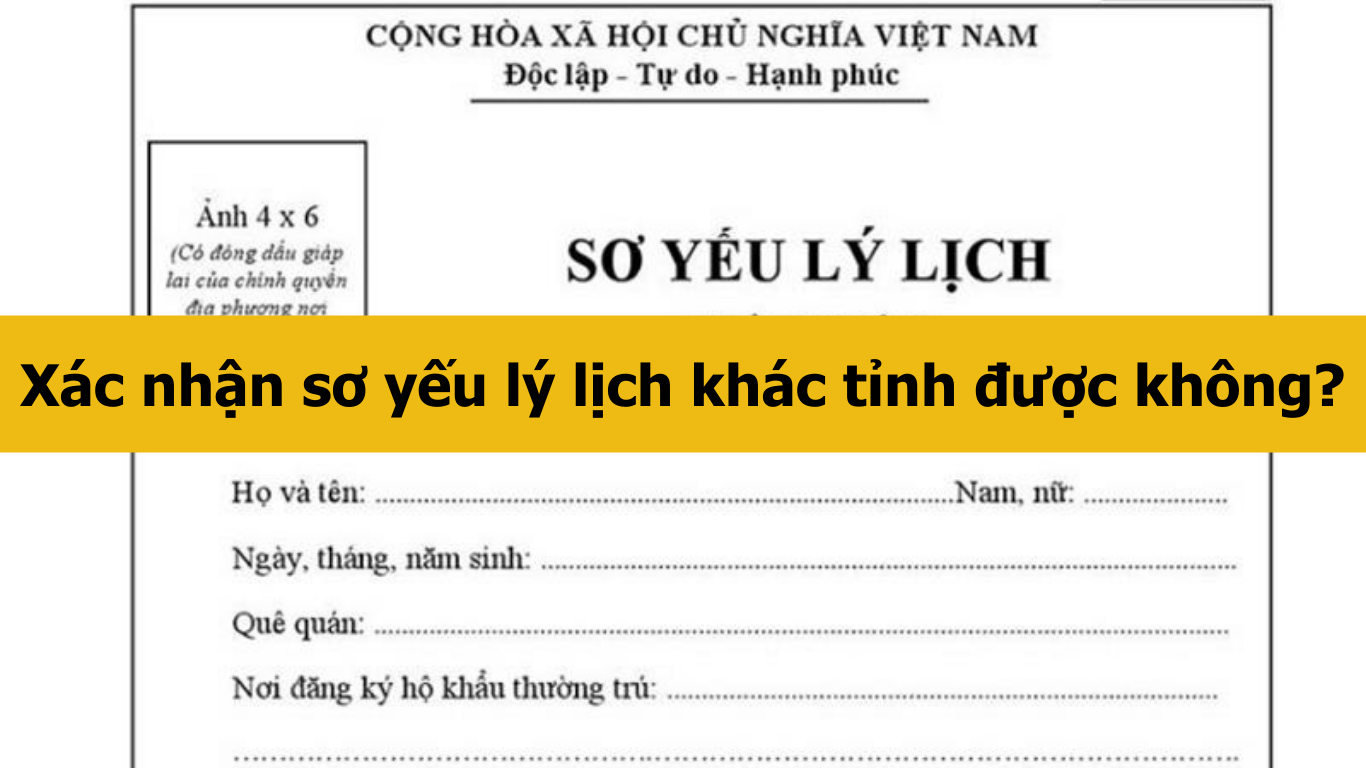
Xác nhận sơ yếu lý lịch khác tỉnh được không?
Sơ yếu lý lịch là loại giấy tờ quan trọng trong rất nhiều hoạt động như xin việc làm, nhập học…Nhiều người vẫn còn thắc mắc xác nhận sơ yếu lý lịch khác tỉnh được không? Bài viết này chúng tôi sẽ trả lời cho câu hỏi đó. 08/01/2025Xác nhận sơ yếu lý lịch ở đâu? Xác nhận sơ yếu lý lịch có cần về quê không?
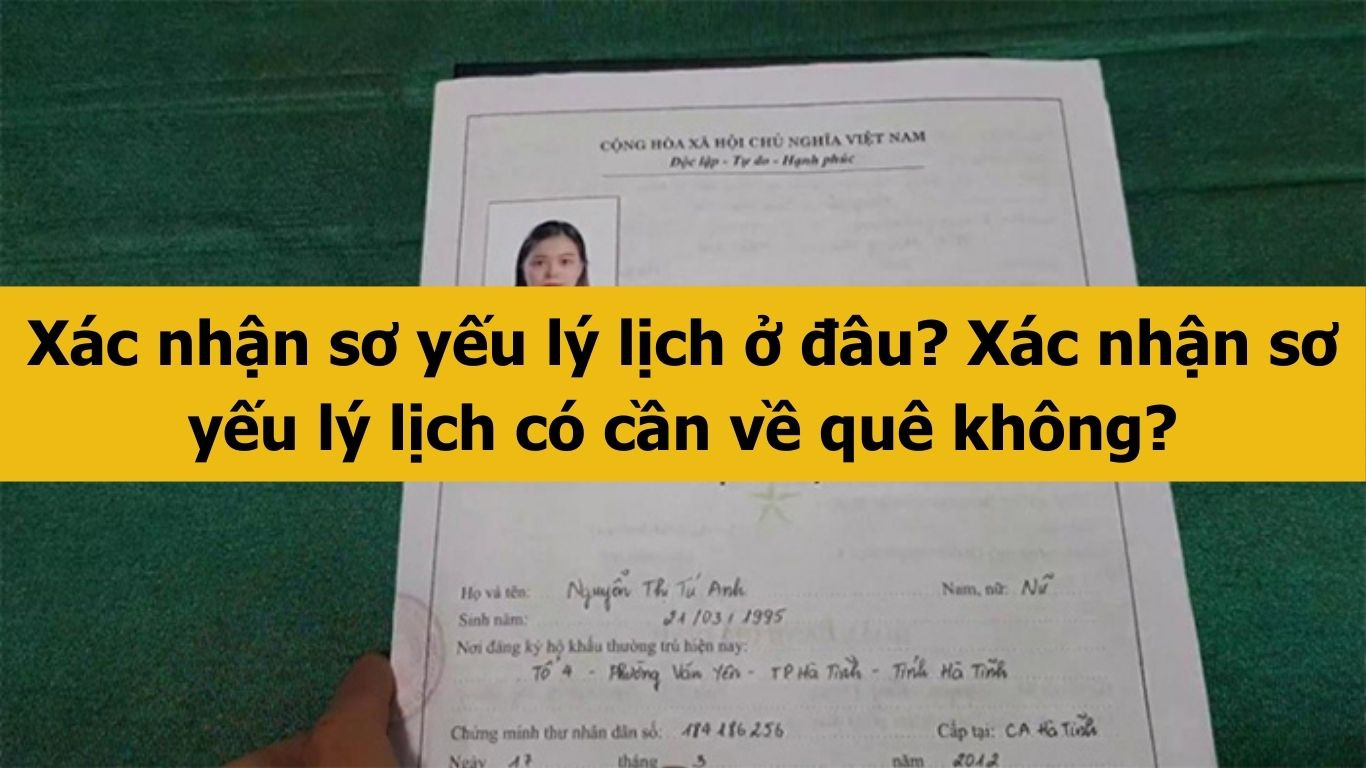
Xác nhận sơ yếu lý lịch ở đâu? Xác nhận sơ yếu lý lịch có cần về quê không?
Sơ yếu lý lịch là loại giấy tờ quan trọng trong rất nhiều hoạt động như xin việc làm, nhập học…Nhiều người vẫn còn thắc mắc xác nhận sơ yếu lý lịch ở đâu? Xác nhận sơ yếu lý lịch có cần về quê không? Qua bài viết này, chúng tôi sẽ trả lời cho các câu hỏi trên. 08/01/2025Xác nhận sơ yếu lý lịch cần giấy tờ gì? Có cần sổ hộ khẩu không?
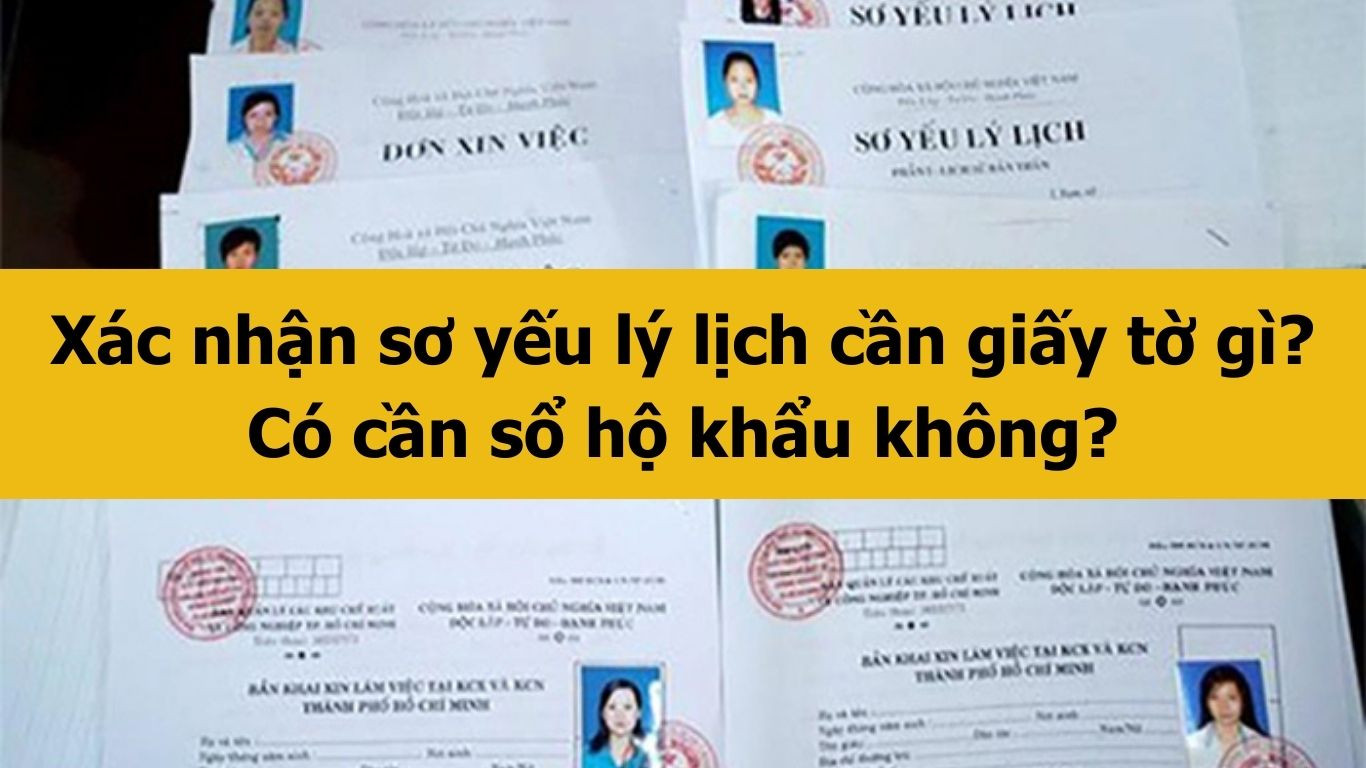
Xác nhận sơ yếu lý lịch cần giấy tờ gì? Có cần sổ hộ khẩu không?
Sơ yếu lý lịch là loại giấy tờ quan trọng trong rất nhiều hoạt động như xin việc làm, nhập học…Nhiều người vẫn còn thắc mắc xác nhận sơ yếu lý lịch cần giấy tờ gì? Có cần sổ hộ khẩu không? Chúng tôi qua bài viết này sẽ giúp trả lời cho những câu hỏi đó. 08/01/202503 mẫu sơ yếu lý lịch xin việc mới nhất 2025 và cách ghi chi tiết

03 mẫu sơ yếu lý lịch xin việc mới nhất 2025 và cách ghi chi tiết
Mẫu sơ yếu lý lịch không chỉ giúp nhà tuyển dụng có cái nhìn tổng quan về ứng viên mà còn phản ánh sự chuyên nghiệp của họ. Để đáp ứng nhu cầu thay đổi và yêu cầu ngày càng cao trong tuyển dụng, các mẫu sơ yếu lý lịch xin việc mới nhất 2025 đã có nhiều cập nhật về nội dung và hình thức. Trong bài viết này, chúng ta sẽ cùng tìm hiểu về 03 mẫu sơ yếu lý lịch xin việc mới nhất 2025 và cách ghi chi tiết để giúp ứng viên tạo ấn tượng mạnh với nhà tuyển dụng. 30/12/2024Mẫu Sơ yếu lý lịch có xác nhận của địa phương mới nhất 2025
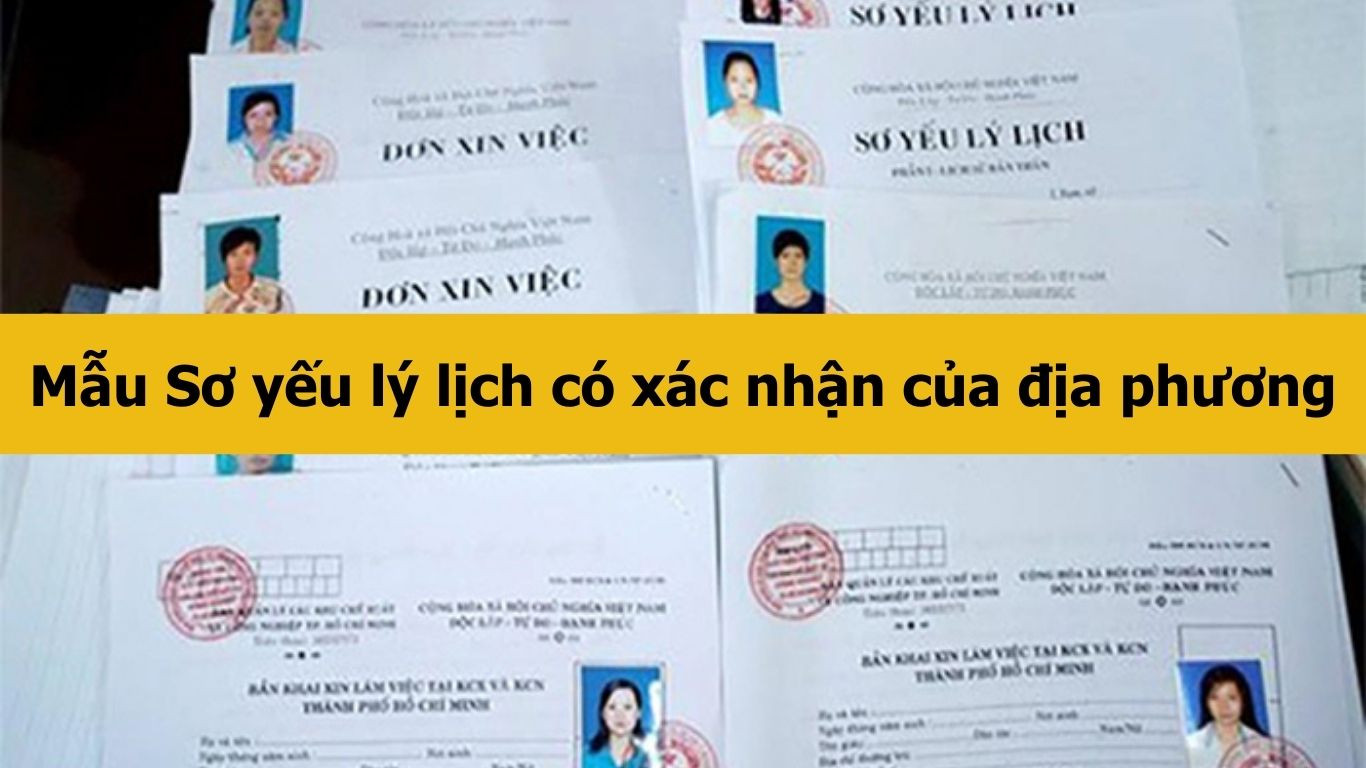
Mẫu Sơ yếu lý lịch có xác nhận của địa phương mới nhất 2025
Sơ yếu lý lịch có xác nhận của địa phương được sử dụng trong rất nhiều hoạt động như xin việc làm, nhập học…Sơ yếu lý lịch là loại giấy tờ quan trọng trong các hoạt động ấy. Trong bài viết này, chúng tôi sẽ cung cấp mẫu Sơ yếu lý lịch có xác nhận của địa phương mới nhất 2025 và một số vấn đề liên quan đến sơ yếu lý lịch. 04/01/2025Sơ yếu lý lịch có được đánh máy không? Mẫu sơ yếu lý lịch đánh máy chuẩn mới nhất

Sơ yếu lý lịch có được đánh máy không? Mẫu sơ yếu lý lịch đánh máy chuẩn mới nhất
Sơ yếu lý lịch là một trong những loại giấy tờ quan trọng và cần thiết khi làm hồ sơ xin việc hay học tập. Thông qua sơ yếu lý lịch, nhà tuyển dụng sẽ biết được những thông tin cơ bản về ứng viên. Một sơ yếu lý lịch được xem là hợp pháp khi được công chứng đầy đủ. Vậy, sơ yếu lý lịch có được đánh máy không? Mẫu sơ yếu lý lịch đánh máy chuẩn mới nhất. Khám phá câu trả lời chi tiết qua bài viết này. 08/01/2025Sơ yếu lý lịch có cần công chứng không? Công chứng sơ yếu lý lịch ở đâu?


 Nghị định 23/2015/NĐ-CP (Bản Word)
Nghị định 23/2015/NĐ-CP (Bản Word)
 Nghị định 23/2015/NĐ-CP (Bản Pdf)
Nghị định 23/2015/NĐ-CP (Bản Pdf)